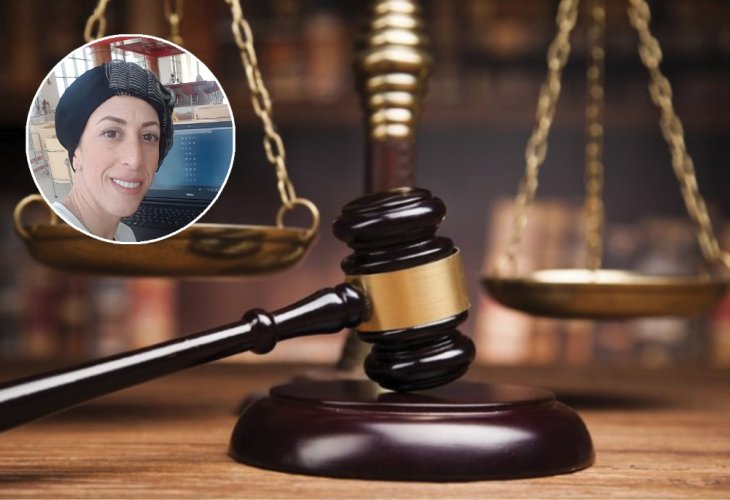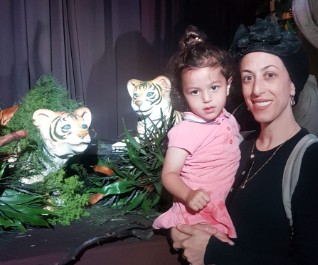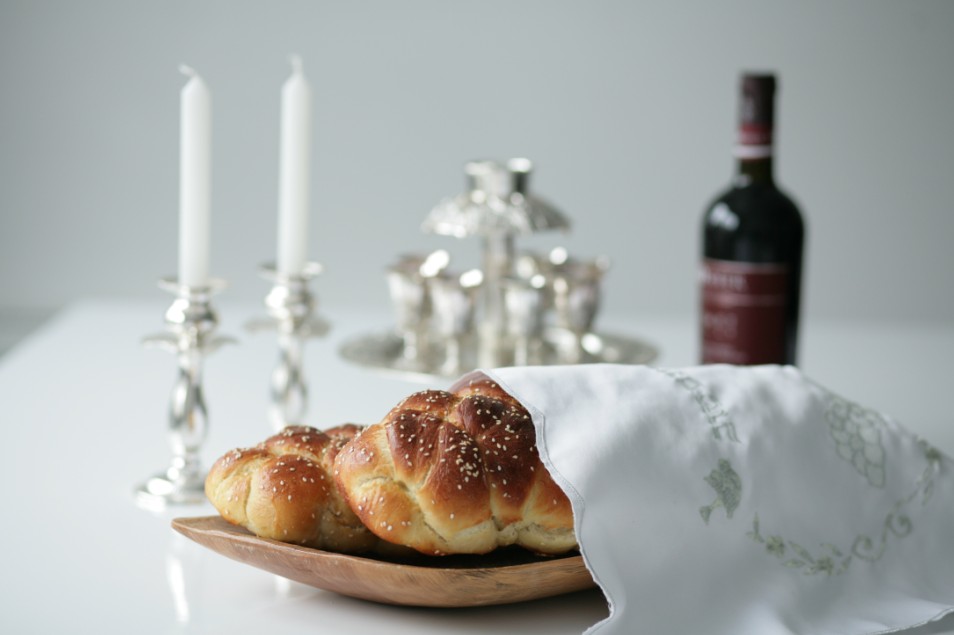Attorney Racheli Otmazgin: "In One Day, I Became 'Ultra-Orthodox', There Was No Interim Period"
Racheli Otmazgin grew up in a traditional household and was first exposed to a Yom Kippur prayer at 15, sparking a life change that led to hidden Torah lessons, studying in an ultra-Orthodox seminary, and building a home with a Torah scholar husband. How did her parents react?
 (Photo illustration: Shutterstock). In circle: Racheli Otmazgin
(Photo illustration: Shutterstock). In circle: Racheli OtmazginMany know attorney Racheli Otmazgin through her professional role. She practices family law and handles a variety of cases. "I feel that in my profession, I can sanctify Hashem's name," she says, "starting with the decision to accept a case, consulting a rabbinic authority in every detail, and finding the right path for the client, with peace and agreement guiding my steps in handling the case."
"I am a mother first and only then an attorney," adds Racheli, "I make sure my day starts with organizing and accompanying my six children to school before heading to work. In the afternoon, I welcome them, give them quality time in the few hours remaining before they sleep, and only then return to legal documents, clients, and claims, often working late into the night."
Racheli appears as a classic ultra-Orthodox woman, dressed modestly and precisely. Her children study in the finest ultra-Orthodox institutions. Her husband, Chaim Otmazgin, commander of ZAKA's special units, is a Torah scholar. It's hard to believe her introduction to the ultra-Orthodox world was only at 15.

Yom Kippur at the Synagogue
"I come from a traditional home," Racheli recalls, "with parents who worked hard to provide for us, a Shabbat Kiddush, hotplate, and kettle, but my living environment wasn't religious, and my education was secular. Leisure included sports, lots of sea and golf. My brother was once Israel's golf champion for several years, and naturally, I participated too. We grew up on the golf park lawns in Caesarea. Torah lessons and synagogue were mainly for celebrations and memorials we needed to attend. Yom Kippur meant everyone was at synagogue with dad, a tradition you couldn't deviate from."
"As I matured, I found myself asking faith-related questions, wanting to understand life's purpose, but had no spiritual authority to quench that thirst. In eighth grade, a friend suggested 'passing' the fast at the synagogue. 'It'll pass quickly and easily,' she encouraged, and I agreed. Despite my young age, it seemed more spiritual and right to be there than playing checkers and backgammon."
"I had a childhood emotional connection to the synagogue. My grandfather was one of its builders, and my family had a fixed, reserved place there, a kind of family meeting point on Shabbat and holidays. But my physical connection to the synagogue was meaningless until that Yom Kippur, when I decided to confront my desire to understand the 'siddur's content' — the unfamiliar texts and the bows at unknown prayer points. For the first time, I asked myself: 'Why are the women next to me crying? To whom are they crying? Did He listen last year?' and many other questions, like a child with a new digital toy."
"My desire overcame my embarrassment, and I whispered to the woman beside me, praying with tears and passion, to mark where I was supposed to cry and bow, because 'I wanted to too'. She began guiding me on that day of self-denial, which became a spiritual elevation day."
The fast went quickly and was an empowering experience. Being very popular in her class, it led Racheli to make an interesting decision — "The next day, I told all my friends: 'This Shabbat, we're all going to synagogue,'" she recalls with a smile.
 (Photo illustration: Shutterstock)
(Photo illustration: Shutterstock)What a declaration. Where did the idea come from?
"It wasn't something trivial, especially for friends who were distant from religion. But I think it mainly came from the synagogue experience that was still etched in me from Yom Kippur, which I wanted them all to experience. I used my social influence to persuade others, encouraging them: 'We'll use Shabbat to bond, share weekly impressions, and enjoy the quiet and peace'. Initially, friends were skeptical of the suggested experience, but I convinced them we'd meet 'in the square', have laughs, and enjoy together."
Racheli can't forget that Shabbat. "I felt something turning inside, not satisfied with tradition; my soul sought closeness to Hashem. I couldn't share the new and profound feelings with my parents, fearing they'd think something bad happened to me."
Strengthening Shabbat observance and synagogue closeness also exposed her to halachic lessons and Torah portions, soon leading to a "lesson chase" created for herself even during weekdays, alone. "Anywhere a lesson was announced, I attended, telling everyone around me the cover story — 'going to the mall, a friend, errands...' I dared not reveal the truth or show the clothes I changed 'on the way to the mall', those modest ones suitable for Torah lessons."
But secrets eventually come out. "One day," she narrates, "after a long period when 'synagogues' consistently got mall names and 'Torah lessons' became 'I went to a show', someone at the regular lesson who knew my father told him nonchalantly about seeing me attending a lesson. Returning from the lesson late at night, I found the worst-awaited — my father sleepwalking in the living room, and entering my room, I saw the large suitcase we always used for travels, wide open with all my wardrobe inside. Initially cynical, I asked: 'What's this? Are we flying abroad?' But my family strongly opposed my lifestyle change and wouldn't accept that the 'revolution' would infiltrate home, and even my father seemed unable to believe his daughter was leading a double life."
"I don't know where I got the courage, but at that moment I took the fifty shekels — my pocket money — from my wallet and declared: 'I'm leaving; if you're not comfortable, I won’t stay here.' I took a small bag and boarded the sole bus heading to the central station, then traveled to Jerusalem. I got off at the famous Sanhedria neighborhood junction, knowing no one. It was Thursday night, and I asked passers-by where a religious boarding house was where I could stay for Shabbat. They directed me to somewhere, and I knocked on their door without the means to pay or explain myself, yet they welcomed me with love. I stayed there all Shabbat, among strictly Orthodox girls, dressed in pleated skirts and cardigans, modest ones, and felt a strong desire to belong. That Shabbat, there were lectures by Rabbi Shlomo Benizri and Rabbi Daniel Shtrit, whose words captured my heart."
From 'Traditional' to 'Ultra-Orthodox'
On Saturday night, Racheli received a call from her father. "He started with 'Shavua tov' (good week), and truthfully, I was surprised by the religious-sounding words. Dad sounded calm and invited me to come home, to 'talk and see how to bridge the gaps between us.' What I later understood was that almost the entire city was searching for me; no one imagined my determination to reach where my heart led, even at the cost of giving up a warm, pampering home. I promised dad I'd return, and so I did."
Racheli notes that upon entering home, she and her father sat for a talk. "Dad asked what I wanted to drink, and I said 'tea', but then remembered we didn't have 'Haslet' mint leaves at home. Initially, I wanted to concoct another excuse as I learned to do, but then I realized it was time to lay everything on the table. I told Dad: 'I'm happy to come back, but my condition is you accept my way of life.' Though my home maintained kashrut and tradition, it was a huge shock for my parents and me because, come Thursday, I was 'traditional' like the whole family, and suddenly after Shabbat, I became 'ultra-Orthodox'. Looking back, I realize we never had a mid-phase experience. I was never 'in transition'. I rapidly turned from 'traditional' to 'ultra-Orthodox', reflected in everything. I explained to Dad what 'my chosen lifestyle' meant - suitable clothes, immersing all household dishes, keeping laws; I didn't want to lie anymore but openly serve Hashem."
"Dad listened thoroughly and said: 'I'm okay with everything you're saying, but promise you won't embrace being a 'baalat teshuva' out of fear or manipulation but genuinely from love. Also, promise never to try turning me religious, just set a good example, and if I want, it'll come from me. One more thing — when you're of age, acquire a formal profession.'"
"These were moments of agreement with a powerful hug; Dad gave me a credit card and said I could buy myself a new wardrobe as I wished, and I went straight to Meah Shearim, bought the most 'Chaniuk' fashionable clothes imaginable but with style — not to completely break my mother's spirit."
How did your mother react?
"For Mom, it was very hard. I didn't know how to explain why 'in August I dress like in December and in December like Antarctica', but we soon reached an understanding. From fearful parents, mine turned supportive, giving me warmth, acceptance, and love. I'm incredibly grateful to them. Today, when they 'experience their ultra-Orthodox daughter', they fill with happiness and satisfaction. I've often heard Dad joking about how 'who would've thought he'd have a grandson with payot sitting on his knee', and when we visit and my kids kiss his hand and ask for a blessing, he says: 'I wish everyone grandchildren with such respect and manners'."
 Photo illustration: Shutterstock
Photo illustration: Shutterstock
A Home of Torah
At fifteen, Racheli sought education aligning with her new path and found it in one of Jerusalem's leading ultra-Orthodox seminaries. When I ask how she was accepted there, she smiles and simply says, "Divine assistance."
Starting her studies, her classmates couldn't imagine she came from a traditional home. Racheli also notes that when a parents' event was held, her mother attended, dressing appropriately for the institution. One day, unable to hold back, Racheli shared her story with her classmates. "They sat in shock," she describes, "for three years they knew me and never imagined the journey I had undergone."
Reaching 'seminar' classes, where one chooses a specialty, Racheli opted for teaching and Judaica with an early childhood specialization, later enrolling in a religious college for Jewish teaching, earning a bachelor's degree. Then, during a home visit, her father reminded her of her promise to study a 'formal profession' in his terms. "He insisted I fulfill this commitment and asked what I wanted to study. I replied that making a living as a 'teacher' was challenging, as it was 18 years ago, and that I was drawn to seeking truth and helping people, so law was fitting. I took a psychometric exam, securing an 810, which easily admitted me to studies. Consulting the guiding rabbi, he directed me to study at the Academic Campus in Kiryat Ono, where separate classes began. That's where I studied amongst the first cohort. By age twenty-five, I held two bachelor's degrees: law and Judaica teaching with early childhood specialization, similar to a standard Orthodox seminary girl, with aspirations to marry and establish a Torah home."
Racheli realized her dreams. "I married a Torah scholar from a respected rabbinical family. I often feel my husband compensates my parents for their past 'ultra-Orthodox son-in-law' fears. He's active for the public good, and they're eager to hear his insights on Torah portions and halacha at every Shabbat table. The Shabbat table at their home shifted from a traditional soccer-discussing table to a Shabbat with songs and Torah discourse, providing a spiritual close to the workweek and energy for a new week."
Racheli concludes: "Looking at my journey in hindsight, it's clear that nothing stands in the way of will, and when you desire something spiritual, you tangibly feel Hashem's hand guiding you at every step. Especially today, with much political opposition towards the ultra-Orthodox, I'm proud to be a defender, one of thousands of rigorously observant women who blend Torah with worldly ways."

